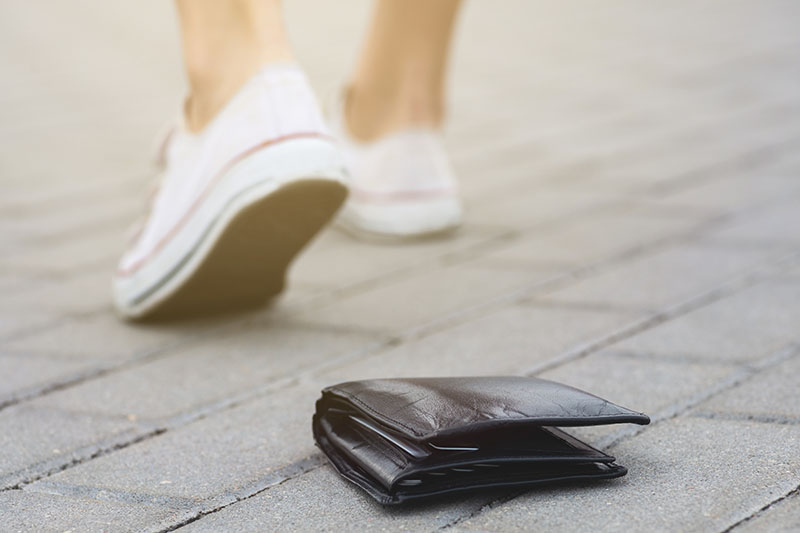'Lost Wallet' Test Reveals How Honest People Are
By Amy NortonHealthDay Reporter

THURSDAY, June 20, 2019 (HealthDay News) -- If you tend to doubt the honesty of strangers, the results of a new study may come as a surprise: All around the globe, people are more likely to return a lost wallet if it's loaded with cash.
In experiments done in 40 countries, researchers found that people were more likely to return a lost wallet to its owner if it contained a large amount of money, versus little to no money. The pattern held true in 38 of the 40 nations.
Globally, 40% of people returned a "missing" wallet if it had no cash. That rose to 51% when it contained a small amount of money -- equivalent to $13.
But if the wallet had a heftier sum -- about $94 -- 72% of people returned it.
It all runs counter to the notion that people act from their own material interests. And the researchers said they themselves were surprised by the findings.
The results were "remarkably consistent" across countries, said researcher Christian Zund, of the University of Zurich in Switzerland.
What seems to be driving people's good behavior? Altruism plays a role, Zund said.
In three countries, the researchers ran a side experiment: Some wallets contained money and a key, while others had no key. It turned out that people were more likely to return the key-containing wallets -- suggesting they were partly motivated by concern for the owner.
But self-image may also be critical, too. In addition to the real-world experiments, the researchers conducted surveys in several countries, asking people to imagine the lost-wallet scenario.
In general, they found, people thought that keeping a wallet with a large amount of money "felt like stealing."
"People do tend to care about the welfare of others, and they also have an aversion to seeing themselves as a thief," said lead researcher Alain Cohn, an assistant professor at the University of Michigan in Ann Arbor.
The study, published June 20 in Science, involved teams of research assistants who fanned out across 355 cities -- the five to eight largest cities in each of the 40 countries.
The assistants posed as good citizens who'd found a wallet, going into the reception areas of various institutions -- banks, museums, hotels, post offices and courthouses -- and handing over the wallet to an employee. Each wallet contained a business card with a phony name and email address. The researchers used those email addresses to track which wallets were reported found.
In the end, the overall reporting rate varied widely across countries -- from 76% to only 14%. At the top were Switzerland, Norway, the Netherlands, Denmark and Sweden. China, Morocco, Peru, Kazakhstan and Kenya rounded out the bottom. (The United States stood in the middle of the pack.)
However, nearly all countries showed the same pattern: People were more likely to return a wallet with a significant amount of money, versus little to no money.
Shaul Shalvi, of the University of Amsterdam in the Netherlands, wrote an editorial published with the study.
Its insights are "very valuable," he said. "This study tackles an important question about human honesty using a task that is relatively easy to control."
The experiment did look at a specific scenario: what people do when they are handed a lost wallet at work. It's possible, Shalvi said, the results would be different if the wallets were left on the sidewalk for anyone to pick up.
But that would have been a much less controlled setup, he noted.
Indeed, the researchers avoided the sidewalk scenario for that reason. "Maybe only dishonest people would pick the wallet up," Cohn said. "Or maybe only honest people would."
Shalvi said it's not clear how well a person's willingness to report a lost wallet predicts other, more complex forms of "civic honesty." But, he added, there are reasons to believe it does.
"Returning a wallet is an action not forced by fear of punishment, so it may serve as a good predictor for one's true nature," Shalvi said. "Of course, whether someone who returns a wallet is also more likely to whistleblow in a corruption case is an open question."
The study also suggests that many people are more cynical than they should be.
The researchers conducted two additional surveys -- one of 279 economists and other "experts," and one of nearly 300 Americans. In both, most respondents incorrectly predicted that people would be less likely to return a lost wallet loaded with cash.
According to Cohn, that suggests people often have an overly pessimistic view of others' honesty.
More information
The nonprofit Good Therapy has more on the science of honesty.

The news stories provided in Health News and our Health-E News Newsletter are a service of the nationally syndicated HealthDay® news and information company. Stories refer to national trends and breaking health news, and are not necessarily indicative of or always supported by our facility and providers. This information is provided for informational and educational purposes only, and is not intended to be a substitute for medical advice, diagnosis, or treatment.

